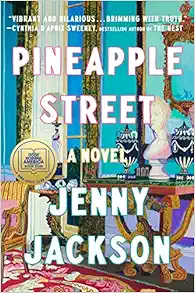
Pineapple Street is a fascinating look at the upper-crust Stockton family. Their money is old money. They are self-pronounced typical WASPs and are not quite ready for their millennial children to question their values and long-proven lifestyle choices.
Tilda and Chip Stockton are the parents of Darley, Cord, and Georgiana. Cord and his wife Sasha live in the family home in Brooklyn Heights in the prestigious fruit streets on Pineapple Street. Since Sasha is of middle-class roots and has far less status than the Stocktons, she is supposed to feel honored to keep everything decorated in the old classic way and maintain the childhood rooms of Cord’s siblings precisely as they left them.
Darley is married to Malcolm, an Asian. Darley is confident in her husband’s ability to provide for her and has therefore chosen to forego a career and her family inheritance since she didn’t want to require Malcolm to sign a prenuptial agreement, which is commonplace and routine when someone marries into the Stockton family. She seems surprised that her children are targets of subtle Asian discrimination, even from her family.
Georgiana is the youngest and much younger than her siblings. She works at a nonprofit and realizes her values do not mesh with her family’s. She is also uniquely sensitive to the subtle and overt biases inherent in many wealthy one-percenters. Georgiana grows influenced by some other millennials unwilling to perpetuate some cultural systems that have allowed families such as hers to enjoy their wealth.
The author masterfully creates an easy-to-read story that delves into American social classes, the politics of MONEY, and family secrets. Contemporary societal issues are addressed through the novel’s events and dialog. It is thought-provoking, and its contents are many-layered. Even the title, although seemingly innocuously referring to an established fruit street in Brooklyn Heights, should give us pause. The book’s text is, “Did you know that the pineapple symbolizes welcome and hospitality?” This follows: “We think of pineapples as this whimsical fruit, but they’re actually a symbol of colonialism and imperialism.”


